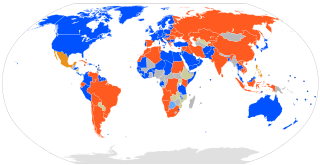The European College of Kosovo, also referred to as ECK, is a higher education institution located in the center of Pristina, Kosovo. [1]
The European College of Kosovo, also referred to as ECK, is a higher education institution located in the center of Pristina, Kosovo. [1]
The college was established in 2013 by local and international professors and it is affiliated with the EU Business School, formerly known as European University in Barcelona. [2] For the academic year 2014/15 classes are taught in Albanian, and all the students are enrolled in bachelor's degree programs. For the academic year 2015/16 the European College of Kosovo's strategic plan is to open doors for international students and offer programs in English language too. European College of Kosovo main mission is "Creation of new European values, for a better future".
Training Centre and professional services is a special unit of the trainings and professional development in different scientific and professional fields within the European college of Kosovo. [3]
International certifications and recognitions from the Centre for trainings and professional development of the European College of Kosovo: Some of the international certifications and recognitions of trainings and testing for which the Centre of trainings and professional development of the European College of Kosovo is licensed are: Pearson Test of English General and Pearson Test of English young Learners. [4]
Spezialization:

Kosovo, officially the Republic of Kosovo is a landlocked country in Southeast Europe with partial diplomatic recognition. It lies in the centre of the Balkans. It unilaterally declared its independence from Serbia on 17 February 2008, and has since gained diplomatic recognition as a sovereign state by 101 member states of the United Nations. It is bordered by Serbia to the north and east, North Macedonia to the southeast, Albania to the southwest, and Montenegro to the west. Most of central Kosovo is dominated by the vast plains and fields of Metohija and Kosovo field. The Accursed Mountains and Šar Mountains rise in the southwest and southeast, respectively. Its capital and largest city is Pristina.

An engineering technologist is a professional trained in certain aspects of development and implementation of a respective area of technology. An education in engineering technology concentrates more on application and less on theory than does an engineering education. Engineering technologists often assist engineers; but after years of experience, they can also become engineers. Like engineers, areas where engineering technologists can work include product design, fabrication, and testing. Engineering technologists sometimes rise to senior management positions in industry or become entrepreneurs.

Prishtina International Airport Adem Jashari, also referred to as Pristina International Airport, is an international airport in Prishtina, Kosovo. The airport is located 15 km (9.3 mi) southwest of the city of Pristina, Kosovo. The airport has flights to numerous European destinations.

The University of Pristina is a public university located in Pristina, Kosovo. It is the institution that emerged after the disestablishment of the University of Pristina (1969–99) as a result of the Kosovo War. The inauguration of the university was a historical occurrence not only for the people of Kosovo, but for the whole Albanian nation. On 15 February, the solemn Parliament session took place, which is also proclaimed as The University of Pristina's Day. In the composition of the newly established University of Pristina were faculties with their headquarters in Pristina: the Faculty of Philosophy, Faculty of Law and Economics, Faculty of Engineering and Faculty of Medicine. Now the University of Pristina has 17 faculties, of which 14 are academic faculties and 3 are faculties of applied sciences. Contained within the emblem is a translation of the name into Latin, Universitas Studiorum Prishtiniensis.
RIT Kosovo, formerly known as the American University in Kosovo, is a private university located in the Germia district of Pristina, Kosovo. The university was established in 2002 and is part of the Rochester Institute of Technology (RIT) in the Rochester, New York, metropolitan area.
Foreign relations of Kosovo are accomplished by efforts of the Ministry of Foreign Affairs of Kosovo. Kosovo operates 33 embassies abroad and is host to 22 embassies in Pristina. Kosovo has membership in several international organisations.

International recognition of Kosovo, since its declaration of independence from Serbia enacted on 17 February 2008, has been mixed, and international governments are divided on the issue.

The following outline is provided as an overview of and topical guide to Kosovo, a territory in the Balkans. See also Kosovo (region).

Atifete Jahjaga is a Kosovar Albanian politician who served as the third President of Kosovo. She was the first female President of the Republic of Kosovo, the first non-partisan candidate and the youngest female head of state to be elected to the top office. She served as Deputy Director of the Kosovo Police, holding the rank of General Lieutenant Colonel, the most senior among women officers in Southeastern Europe.
The Kosovo Protestant Evangelical Church (KPEC) is a Protestant church network based in Pristina, Kosovo. It is one of the four protected major religions in the Kosovo Law of Religious Freedoms. Between 10,000 and 15,000 Kosovar Albanians follow this church, 6,000 in Pristina alone. There are 42 churches in all of Kosovo.

The mass media in Kosovo consists of different kinds of communicative media such as radio, television, newspapers, and internet web sites. Most of the media survive from advertising and subscriptions.
Information and communication technology (ICT) in Kosovo has experienced a remarkable development since 1999. From being almost non-existent 10 years ago, Kosovar companies in the information technology (IT) domain offer today wide range of ICT services to their customers both local as well as to foreign companies. Kosovo has the youngest population in Europe, with advanced knowledge in ICT.
The First Agreement of Principles Governing the Normalisation of Relations, informally known as the Brussels Agreement, is an agreement to normalize relations between the governments of Serbia and Kosovo. The agreement, negotiated and concluded in Brussels under the auspices of the European Union, was signed on 19 April 2013. Negotiations were led by Serbian Prime Minister Ivica Dačić and Kosovo Prime Minister Hashim Thaçi, mediated by EU High Representative Catherine Ashton. The government of Serbia does not recognize Kosovo as a sovereign state, but began normalising relations with the government of Kosovo as a result of the agreement. In Belgrade, the agreement was criticized as a convalidation of Kosovo independence.

Education in Mitrovica is provided by a number of public and private institutions. With more than 36 percent of the population in Mitrovica being under 19 years old Mitrovica has a large number of primary schools, secondary schools and higher education institutes. These schools are located throughout the municipality, which is compromised by the city of Mitrovica, its 26 southern villages, and the northern part of the city.

The National Gallery of Kosovo, formerly known as the Kosova National Art Gallery, is an art gallery situated at The University of Pristina Campus, right behind the National Library of Kosovo in Pristina, Kosovo, founded in February 1979.

Historical monuments in Pristina are made up of 21 monuments out of a total of 426 protected monuments all over Kosovo. A large number of these monuments date back to the Byzantine and Ottoman periods. Since 1945, the Yugoslav authorities followed the idea of constructing a modern Pristina by relying in the urban development motto “destroy the old, build the new” and this resulted with major changes in the structure of the buildings, their function and their surrounding environment. However, numerous types of monuments have been preserved, including four mosques, a restored orthodox church, an Ottoman bath, a public fountain, a clock tower, several traditional houses as well as European-influenced architecture buildings such as the Museum of Kosovo. These symbolize the historical and cultural character of Pristina as it was developed throughout centuries in the spirit of conquering empires.

Fairs in Pristina started since the medieval period, at the time when it was famous for its annual trade fairs and its goat hide and goat hair articles. Pristina always had a development in trading due to its position in the Balkan trade routes. Despite that fact, Pristina, or Kosovo in general, is not known for occurrence of fairs. With the development of culture and especially after the last war in 1999, Pristina has had progress on holding these kinds of events.
Haxhi Zeka University is a public university located in Peja, Kosovo.
Since Kosovo's declaration of independence from Serbia, international recognition of Kosovo has been mixed, and the international community continues to be divided on the issue. The Republic of Kosovo is member of some international intergovernmental and international non-governmental organisations.

Universum College is a university in Prishtina, Kosovo. It was founded in 2005. The university offers 15 undergraduate programs and 8 graduate programs. Studies can be offered with dual study memberships or double degrees with EU universities for specific studies. The college as a higher education provider is accredited by the Kosovo Accreditation Agency. The university is partnered up with 152 universities within the Erasmus+ program. Universum College is also accredited by the University of Northampton to offer programs with English curricula and standards. Students who attend these programs will receive a University of Northampton degree. UON is one of the universities listed in the Teaching Excellence Framework (TEF).